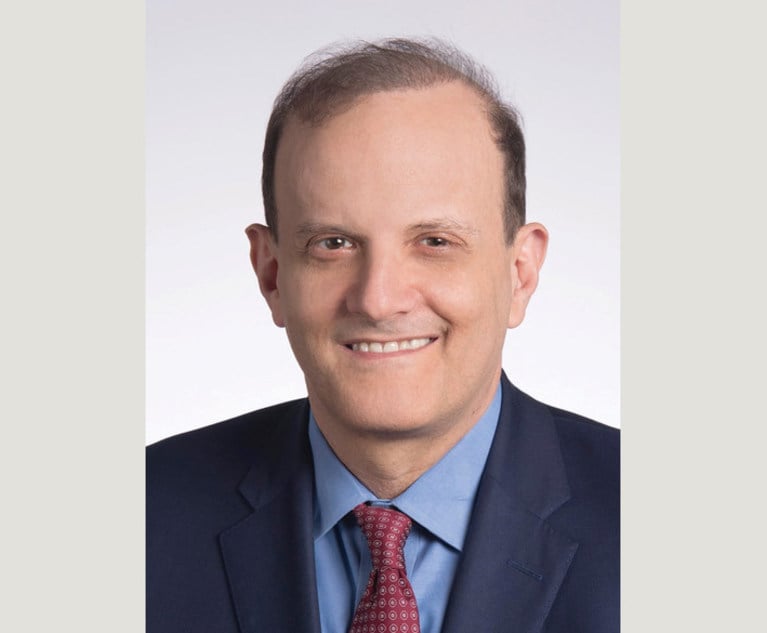 Courtesy photo
Courtesy photoCozen O'Connor Settles With Investors in Ponzi Scheme Case
The firm has fully settled with the plaintiffs, its lawyer said, but a judge refused to dismiss it from the case completely.
August 09, 2019 at 12:01 PM
4 minute read
Cozen O’Connor has agreed to a settlement with a group of investors who alleged the law firm was involved in a real estate investment scheme that cost the investors millions.
But the law firm is not entirely out of the case, in which commercial real estate company Cushman & Wakefield remains a defendant. Cozen O’Connor will be included on the verdict sheet at trial, and will have to produce its settlement agreement for the court, U.S. District Senior Judge Jan E. DuBois of the Eastern District of Pennsylvania ruled.
The investor plaintiffs and Cozen O’Connor filed a motion seeking dismissal of the claims against Cozen O’Connor with prejudice, and the law firm requested that the court rule as a matter of law that it is not a joint tortfeasor with Cushman & Wakefield.
DuBois denied the voluntary dismissal motion Aug. 6.
William Harvey of Klehr Harrison Harvey Branzburg, who represents Cozen O’Connor, said Cushman & Wakefield would have been entitled to discovery on the amount of Cozen O’Connor’s settlement anyway, so the decision does not have a great impact on the firm. He said Cozen O’Connor reached a complete settlement with the plaintiffs.
Fellow Philadelphia-based Am Law 100 firm Blank Rome was also a defendant in the case, but it reached a settlement last year.
The decision stems from a case in which plaintiffs Kilbride Investments Ltd., Busystore Ltd. and Bergfeld Co. Ltd. accused Cozen O’Connor, Blank Rome and Cushman & Wakefield of fraudulently misrepresenting a development project in Philadelphia, leading the plaintiffs to invest more than $27 million.
The investors claimed Charles Naselsky, a disbarred lawyer who once worked at both Cozen O’Connor and Blank Rome, conspired with Philadelphia real estate developers to get the investors to put millions of dollars into a project that would be barred by zoning restrictions.
The investors alleged that the law firms were part of a scheme orchestrated by Eliyahu Weinstein, who was convicted of fraud and sentenced to 22 years in prison for operating a massive Ponzi scheme that stole money from members of the Orthodox Jewish community under the guise of investing in Philadelphia real estate projects.
They alleged that Cushman & Wakefield fraudulently appraised a property in Philadelphia called River City that stretches from John F. Kennedy Boulevard to the Schuylkill River. Cushman & Wakefield denied the allegations and claimed Weinstein was the source of the investors’ misfortune.
The case was originally filed in New York federal court, but was moved to the U.S. District Court for the Eastern District of Pennsylvania in 2013 at Cozen O’Connor and Blank Rome’s request. Naselsky is not a defendant in the suit. He was sentenced to 70 months in prison for an unrelated tax evasion scheme.
In February 2018, the court found that Cozen O’Connor may still be found liable for Naselsky’s actions while he was employed at the firm, but that the firm can’t be held liable for the lawyer’s conduct after he moved to Blank Rome.
Blank Rome settled with the investors in March 2018, and agreed that any judgment in the lawsuit would be reduced by the percentage share of liability attributed to Blank Rome.
But there was a difference between the two law firms’ settlements, this week’s opinion said.
“In contrast to the release agreement entered into by plaintiffs and Blank Rome, plaintiffs and Cozen have not conceded joint tortfeasor status or agreed to an automatic reduction,” DuBois wrote. “As a result, C&W has the right to require Cozen to remain in the case through trial for the purpose of determining liability and the amount of any pro rata reduction in any verdict for plaintiffs.”
This content has been archived. It is available through our partners, LexisNexis® and Bloomberg Law.
To view this content, please continue to their sites.
Not a Lexis Subscriber?
Subscribe Now
Not a Bloomberg Law Subscriber?
Subscribe Now
NOT FOR REPRINT
© 2025 ALM Global, LLC, All Rights Reserved. Request academic re-use from www.copyright.com. All other uses, submit a request to [email protected]. For more information visit Asset & Logo Licensing.
You Might Like
View All
Chair of Montgomery McCracken Decamps for Morgan Lewis

Avoiding Conflict When Relating Advice to an Adverse Party to Facilitate a Client Matter
4 minute read
Trending Stories
- 1Deal Watch: Latham, Paul Weiss, Debevoise Land on Year-End Big Deals. Plus, Mixed Messages for 2025 M&A
- 2Bathroom Recording Leads to Lawyer's Disbarment: Disciplinary Roundup
- 3Conn. Supreme Court: Workers' Comp Insurance Cancellations Must Be Unambiguous
- 4To Avoid Conflict, NYAG Hands Probe Into Inmate's Beating Death to Syracuse-Area DA
- 5Scripture-Quoting Employee Sues Company for Supporting LGBTQ Pride
Who Got The Work
Michael G. Bongiorno, Andrew Scott Dulberg and Elizabeth E. Driscoll from Wilmer Cutler Pickering Hale and Dorr have stepped in to represent Symbotic Inc., an A.I.-enabled technology platform that focuses on increasing supply chain efficiency, and other defendants in a pending shareholder derivative lawsuit. The case, filed Oct. 2 in Massachusetts District Court by the Brown Law Firm on behalf of Stephen Austen, accuses certain officers and directors of misleading investors in regard to Symbotic's potential for margin growth by failing to disclose that the company was not equipped to timely deploy its systems or manage expenses through project delays. The case, assigned to U.S. District Judge Nathaniel M. Gorton, is 1:24-cv-12522, Austen v. Cohen et al.
Who Got The Work
Edmund Polubinski and Marie Killmond of Davis Polk & Wardwell have entered appearances for data platform software development company MongoDB and other defendants in a pending shareholder derivative lawsuit. The action, filed Oct. 7 in New York Southern District Court by the Brown Law Firm, accuses the company's directors and/or officers of falsely expressing confidence in the company’s restructuring of its sales incentive plan and downplaying the severity of decreases in its upfront commitments. The case is 1:24-cv-07594, Roy v. Ittycheria et al.
Who Got The Work
Amy O. Bruchs and Kurt F. Ellison of Michael Best & Friedrich have entered appearances for Epic Systems Corp. in a pending employment discrimination lawsuit. The suit was filed Sept. 7 in Wisconsin Western District Court by Levine Eisberner LLC and Siri & Glimstad on behalf of a project manager who claims that he was wrongfully terminated after applying for a religious exemption to the defendant's COVID-19 vaccine mandate. The case, assigned to U.S. Magistrate Judge Anita Marie Boor, is 3:24-cv-00630, Secker, Nathan v. Epic Systems Corporation.
Who Got The Work
David X. Sullivan, Thomas J. Finn and Gregory A. Hall from McCarter & English have entered appearances for Sunrun Installation Services in a pending civil rights lawsuit. The complaint was filed Sept. 4 in Connecticut District Court by attorney Robert M. Berke on behalf of former employee George Edward Steins, who was arrested and charged with employing an unregistered home improvement salesperson. The complaint alleges that had Sunrun informed the Connecticut Department of Consumer Protection that the plaintiff's employment had ended in 2017 and that he no longer held Sunrun's home improvement contractor license, he would not have been hit with charges, which were dismissed in May 2024. The case, assigned to U.S. District Judge Jeffrey A. Meyer, is 3:24-cv-01423, Steins v. Sunrun, Inc. et al.
Who Got The Work
Greenberg Traurig shareholder Joshua L. Raskin has entered an appearance for boohoo.com UK Ltd. in a pending patent infringement lawsuit. The suit, filed Sept. 3 in Texas Eastern District Court by Rozier Hardt McDonough on behalf of Alto Dynamics, asserts five patents related to an online shopping platform. The case, assigned to U.S. District Judge Rodney Gilstrap, is 2:24-cv-00719, Alto Dynamics, LLC v. boohoo.com UK Limited.
Featured Firms
Law Offices of Gary Martin Hays & Associates, P.C.
(470) 294-1674
Law Offices of Mark E. Salomone
(857) 444-6468
Smith & Hassler
(713) 739-1250






